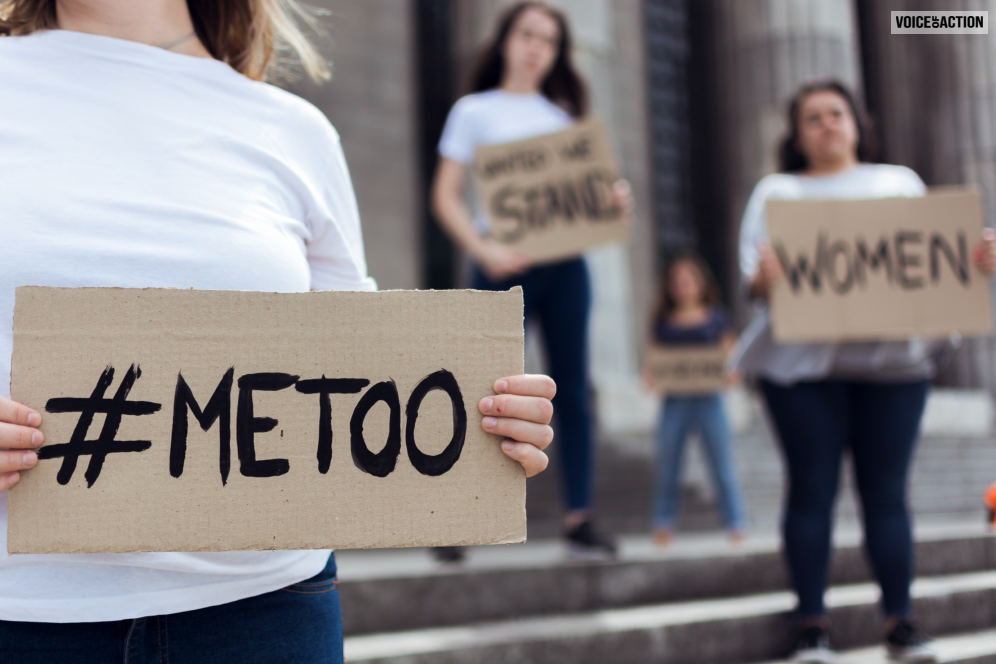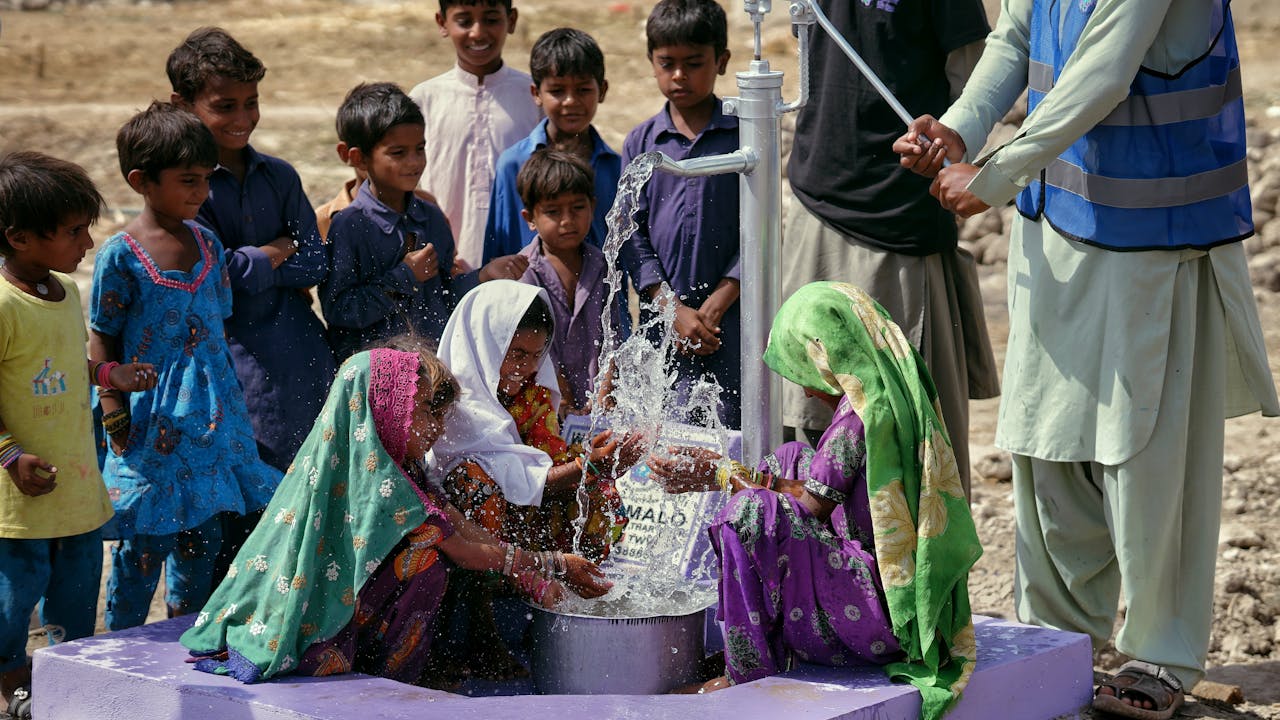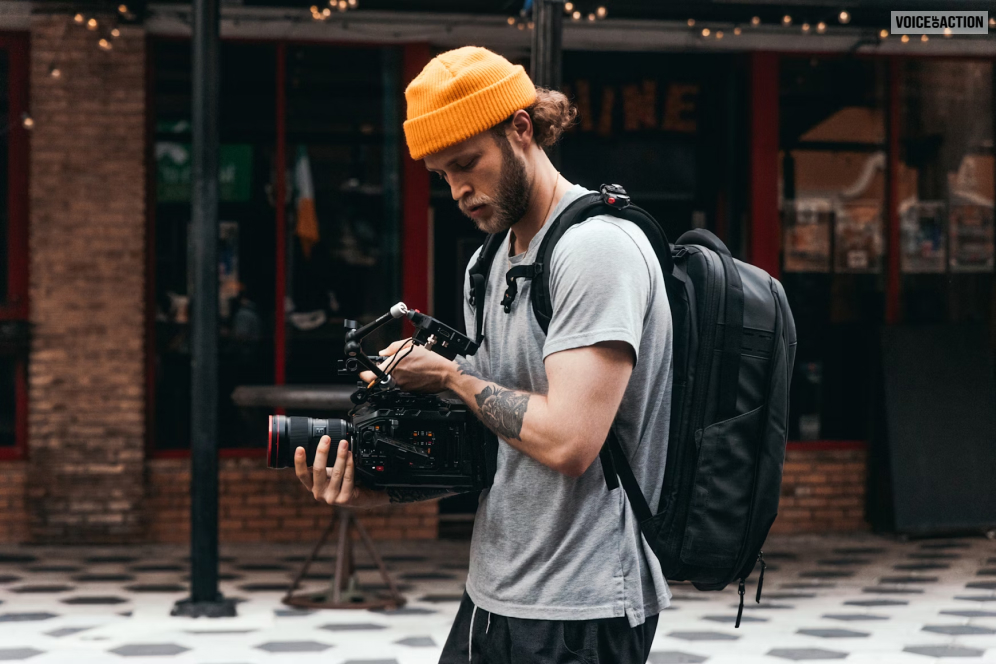The #MeToo Movement: Unmasking Sexual Harassment In Hollywood And Beyond

Life is not a bed of roses, and our society never fails to prove that. How many times have you faced a stranger popping out his eye on your mini skirt? Or a colleague touching your shoulder “not-so-casually?”
Trust me, we all have been prey to such situations once in a lifetime. The #MeToo movement was one of those social movements that had an impeccable impact on people all around the world.
This social awareness campaign aimed at encouraging people to be more vocal against rape culture and sexual abuse. Following the reformation’s popularity, a lot of females raised their voices and shared their experiences on social media platforms.
History and Origin Of #MeToo

It all began with Tarana Burke, an activist and sexual assault survivor, using the hashtag #MeToo on Myspace. Later, in October 2017, several allegations of sexual abuse arose against Harvey Weinstein, a popular film producer.
After this, the social cause began spreading like fire. Alyssa Milano, the American actress, posted on Twitter stating that if all women who have been prey to sexual abuse or assault write “Me Too” in the comments, there will be a push to the movement.
It helped them to understand how many women have faced sexual harassment at work. Ashley Judd, Uma Thurman, Jennifer Lawrence- a number of high-profile responses started surfacing on the Internet, giving a thumbs up to the incoming fame.
After so many uses of the hashtag and phrase, the expression started gaining recognition in other countries and languages, too. In 2017, a Facebook report determined more than 50% of American users knew someone who had been sexually harassed before.
Investigation Against Hollywood Stars and After-Effects Of The Process

Journalism played a crucial role in bringing the movement to light, along with social media activism. There were various documentaries made on real-life sexual harassment encounters.
The New York Times, in 2017’s October, published a piece in which Megan Twohey and Jodi Kantor investigated producer Weintstein’s behavior. Both the journalists have continued to reveal Weinstein’s predatory mindset.
He stage-managed a lot of private settlements so that his victims do not raise a voices. Ashely Judd shared her experience when Weinstein scheduled a corporate meeting in a hotel room and suddenly started making unwelcomed sexual approaches.
In the following weeks, Ronan Farrow started unmasking Weinstein in New York, publishing more women accounting against him. Both The New Yorker and The New York Times had received a shared Pulitzer Prize for their impactful journalism.
What were the investigation outcomes?
Both Los Angeles and New York courts charged Weinstein with sexually assaulting and raping young girls. The outcome was what we would have expected; he was convicted of 16-year and 23-year prison sentences.
And it was not only Weinstein’s name that got dragged into the mud. After back-to-back investigations, over 200 influential people lost their jobs and became the subject of public shaming.
Charlie Rose, who hosted a PBS show and was also featured on CBS, had to give away both his jobs in 2017. More than eight women had alleged him of sexual harassment. NBC Today’s co-host, Matt Lauer, also got fired after a woman filed his inappropriate sexual behavior in office.
The Role Of Men In The #MeToo Movement

Not everything that we see around us is true. The original concept of #MeToo was to give voices to women who couldn’t speak for themselves against sexual abuse or harassment.
However, this did not go well with some people because women started using fake allegations to call out people. In the wake of #MeToo came stories where men were scared of false allegations. A poll by Morning Consult depicted-
57% of adult men in the U.S. were equally concerned for their co-workers or other females associated with the harassment they might face. On the flip side, 60% of men do not want to mentor females at work due to the fear of illegitimate accusations.
A “Pew” research points out how most respondents of surveys believe that the movement has made it difficult for men to interact with women. Workplaces started becoming more hostile due to new policies and regulations against sexual harassment.
Some women found it funny because they claim that men don’t have to worry about allegations unless they commit some wrongdoing. There has been a constant focus that false reports only made up 2% of overall claims.
What Changed and What Didn’t After This?

- We cannot stress the fact enough that #MeToo really helped to increase awareness about sexual harassment prevalence at work. A number of industries introduced the POSH or Prevention of Sexual Harassment Policy to keep female workers safe.
- Women were more encouraged to speak their minds. There is a stigma attached to the fact that reporting sexual harassment incidents will sabotage the victim’s reputation.
- The movement, however, was successful in changing the scenario somewhat. Females were less scared to speak now because there were plenty of them. A number of investigations sped up after allegations under #MeToo.
Sarah Ann Masse:
Harvey Weinstein interviewed Masse in his underwear when he was looking for a nanny for his kids. This was back in 2008 when he grabbed her and gave them a tight hug, which, of course, was not too welcoming.
Sarah says it was then that she realized that she wasn’t the only one here. She added that the first story gave her immense courage to talk about this and not worry about her career getting destroyed.
In an interview with Variety, she shared her story, stating that she was “most fearful about retaliation.” However, in the initial months, when people started talking about their stories, she felt a sense of understanding and support within the community.
Chloe Dykstra:
After sharing her #MeToo movement story, she was terrified. Chloe says her face was all over Twitter, and she didn’t like it. She described her story of a sexually and emotionally abusive relationship.
Her ex-boyfriend was Chris Hardwick, who then hosted the Talking Dead Show. Initially, she had tons of supporting messages, but then came the attacks. She quotes-
“I was attacked relentlessly. There was an organized group of people online whose sole purpose was to try to disprove me…”
All in all, the rallying cry of #MeToo went viral, and Chloe had the courage to speak against his ex-boyfriend, who was an influential person then.
Juana Melara:
Juana was a hotel worker in California who also had to face terrifying experiences. She shares instances of guests flashing and propositioning on several occasions while cleaning hotel rooms.
She further adds that the hotel industry had great chances before the movement to support such protections, but they chose not to do so. More than 46,000 signatures were collected from women globally.
Juana also continued that such a massive step wouldn’t have been taken if the hotel authorities worked fast and taken some drastic measures.
Jessica Howard:
Howard, who has dealt with depression for a prolonged time, said she isn’t sure whether to call herself a survivor or a victim. She survived abuses at the hands of Larry Nassar, who is a USA Gymnastics doctor.
She shares how 2017 was the most disastrous time of her life, and January was no less than a life-or-death scenario.
Howard was one of the first females to advocate against Nassar. They took an active part in the #MeToo movement and helped women to receive $500 million, each of whom Nassar abused.
How A Mere Hashtag Became The Voice Against Sexual Misconduct?

It is needless to say, #MeToo dates back to before social media was even a thing. The overall journey from Burke to so many other women was interesting to witness. The way we underestimate its impact on society must change.
The reformation has consisted of a plethora of methods and hashtags leveraged by women. Weinstein’s revelations, along with several others, helped people down, irrespective of their power and authority.
Ever since the #MeToo rose to fame, there have been small, insignificant changes. The issue of sexual misconduct is deep-rooted in society, and in order to mitigate such instances, consistent efforts have to be made.
Last but not least, the effects might be seen one day when women do not have to be anonymous anymore to share their real encounters. Sexual harassment is something we face every other day, and the person who should actually be ashamed of is the perpetrator, not the victim.
Final Words
Tarana Burke’s vision of joining more women to the cause certainly created an awareness among survivors. The long shut voice could now come into existence, knowing that the abuser can do no wrong to them.
Sexual harassment in the workplace must be dealt with severity, and there should be proper rules in place to punish those at fault. Considering this, the #MeToo movement is somewhat successful as people have tried implementing measures to protect women.
With that, here’s an end to an article that is also “too vocal” for you all. If you are someone who has faced sexual misconduct or if you know someone, don’t hesitate to talk about it. Comment below and share your thoughts with us!
Continue Reading:

























